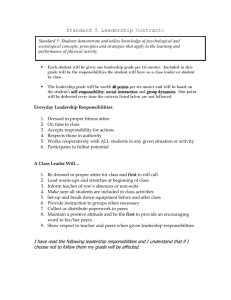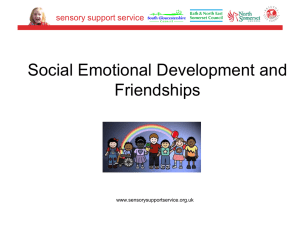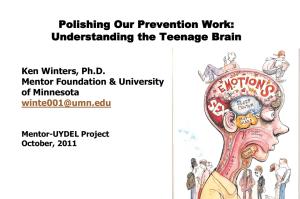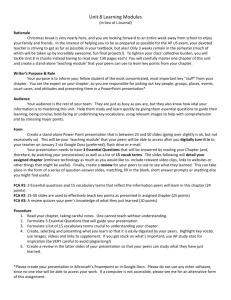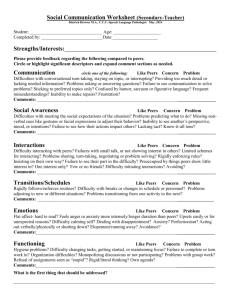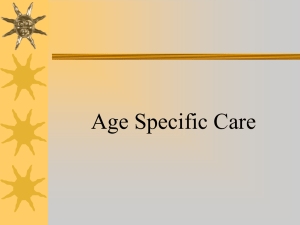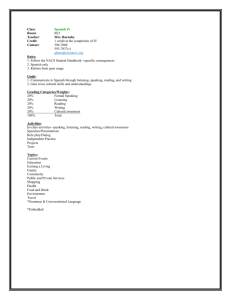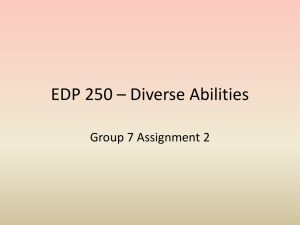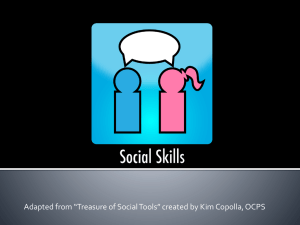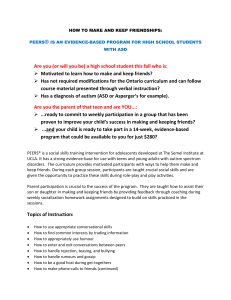PEERS training materials
advertisement
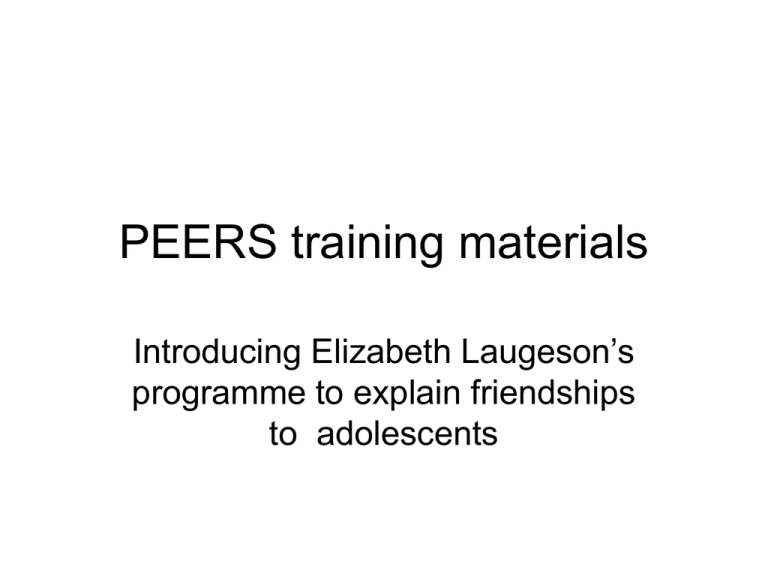
PEERS training materials Introducing Elizabeth Laugeson’s programme to explain friendships to adolescents Aims of the course • To learn about the PEERS programme • To identify pupils who may benefit • To increase understanding of how PEERS differs from other programmes • To gain confidence in how we speak to young people about unwritten rules of social interaction • To consider how it could be used in your school What is the PEERS programme? • Dr Elizabeth Laugeson - clinical psychologist from U.C.L.A • Carried out research with Professor Fred Frankel to find most effective techniques to support adolescents with social interaction difficulties (including ASD) to make friends • PEERS Manual for pupil, staff and parents and The Science of Making Friends 2013 What is the PEERS programme? • Program for the Evaluation and Enrichment of Relational Skills • Original programme is for 14 sessions where two groups are facilitated, one for pupils and one for parents who are trained as coaches • New book is for home use divided into 13 hands-on sections supported by a DVD of video demonstrations Who may benefit? • Materials are aimed at adolescents who want to learn how to make and keep friends • E.L found 55% of pupils were more or less accepted by their peers with 15 % being popular • 30% of pupils experienced either peer rejection or social neglect Who may benefit? • Peer rejection (15%) –actively seek out friends but are perceived as ‘weird’, hyper verbose. Make unfunny jokes, monopolise conversations and are rejected. May get a bad reputation as being odd. • Socially excluded (15%)-shy,withdrawn and rarely speak in social situations. May experience depression, anxiety and can go unnoticed • Being alone also makes you vulnerable to bullying How PEERS is different • PEERS is evidence based. • Baselines and results were evaluated using questionnaires that can be used in school to measure outcomes • Test of Adolescent Social Skills Knowledge * (TASSK) • Quality of Play Questionnaire for parents and adolescents (QPQ-P) (QPQ-A)* How PEERS is different • It is based on what really works – ecologically valid • Works alongside the student in partnership • Builds on their strengths e.g. uses rules to structure up social interaction • Uses key phrases to act as reminders and affirmations e.g. Friendship is a choice • It can be supported by a mobile phone app • Not a buddying system So how does it do it? • Find students who want to learn • Students need to be aware of their own anxiety levels - we have the Anxiety Programme in MK that we can use first • Begin by considering students own interests • Then observe the social interactions around you-identify a group where you may find like-minded people Who is out there ?? • Activity identify at least 10 groups of teens How can I make him my friend? Friendship is a choice • Programme is about reality and will not promise to make everything easy. • Lessons about humour feedback to help students realise when they are being laughed at rather than with • How to read gaze aversion and what that means and how to withdraw from situations Typical session How would it look in my school? • 14 sessions with parents too is a huge commitment • Programme could be divided into two parts each of 8 sessions just with students • Part 1 Developing and maintaining friendships • Part 2 Handling rejection and conflict To begin.. • Ask class tutors and mentors to identify possible students • Meet with students individually to explain what it is about – have a flyer for students and families explaining what it is about • Identify a room that will be available and time that colleagues will accept you removing pupils • Facilities to share DVD Set up • Complete the questionnaires so you can evaluate the intervention ( Specialist Teaching Team can supply templates) • Perhaps invite families to an information session Part 1 • • • • • • • • Finding and choosing good friends Good conversations:The basics Starting and entering conversations Exiting conversations Managing electronic communication Showing good sportsmanship Enjoying successful get togethers Celebration session Part 2 • Revisit Part 1- share emotional toolkit tips • Dealing with rejection-teasing and embarrassing feedback • Bullying and bad reputations • Changing a bad reputation • Handling disagreements • Rumours and gossip • Celebration Questions? References • TASSK- Modification of the Test of Social Skills Knowledge (Frankel,F.,Erhardt,D.,Renenger,K.,&Pataki,C.,2009)by permission of authors • QPQ-P & A-Adapted from Frankel & Mintz(2008) by permission of authors
